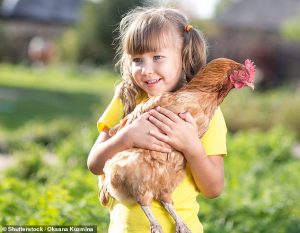Queensland’s latest salmonella outbreak has caused officials to warn backyard chicken owners to practice biosecurity steps to ensure everyone’s safety in handling the animals. Since June 26, 17 cases of Salmonella typhimurium have been documented.
 According to ABC News, 13 of the cases were aged 11 or younger. Additionally, five out of the 17 cases were admitted to the hospital. The recent outbreak has been associated with chicks from an unnamed supplier.
According to ABC News, 13 of the cases were aged 11 or younger. Additionally, five out of the 17 cases were admitted to the hospital. The recent outbreak has been associated with chicks from an unnamed supplier.
Backyard poultry can appear harmless, healthy, and clean but can carry Salmonella spp or Campylobacter spp. Moreover, chicken coops, habitats, and eggs could also become contaminated.
Zoonotic diseases that backyard poultry may transmit to humans include salmonellosis, campylobacteriosis, and avian influenza viruses. Since the 1990s, epidemics of human Salmonella spp infections connected to contact with backyard chickens have been recorded in the United States.
In Victoria, nine cases of salmonella in two months were linked to the pet chicks and their eggs.
And in the U.S., the Centers for Disease Control reported that as of June 23, 2020, there were 465 recent cases of Salmonella linked to backyard poultry, including one death, an increase of 368 ill people since the previous report on May 20, 2020.
CDC says always wash your hands and don’t kiss backyard poultry or snuggle them and then touch your face or mouth.
Don’t let backyard poultry inside the house, especially in areas where food or drink is prepared, served, or stored.
Set aside a pair of shoes to wear while taking care of poultry and keep those shoes outside of the house.
Don’t eat or drink where poultry live or roam.
Stay outdoors when cleaning any equipment or materials used to raise or care for poultry, such as cages and containers for feed or water.
Supervise kids around poultry.
Always supervise children around poultry and while they wash their hands afterward.
 Children younger than 5 years of age shouldn’t handle or touch chicks, ducklings, or other poultry. Young children are more likely to get sick from germs like Salmonella.
Children younger than 5 years of age shouldn’t handle or touch chicks, ducklings, or other poultry. Young children are more likely to get sick from germs like Salmonella.
Handle eggs safely.
Collect eggs often. Eggs that sit in the nest can become dirty or break.
Throw away cracked eggs. Germs on the shell can more easily enter the egg though a cracked shell.
Eggs with dirt and debris can be cleaned carefully with fine sandpaper, a brush, or a cloth.
Don’t wash warm, fresh eggs because colder water can pull germs into the egg.
Refrigerate eggs after collection to maintain freshness and slow germ growth.
Cook eggs until both the yolk and white are firm. Egg dishes should be cooked to an internal temperature of 160°F (71°C) or hotter. Raw and undercooked eggs may contain Salmonella bacteria that can make you sick.
